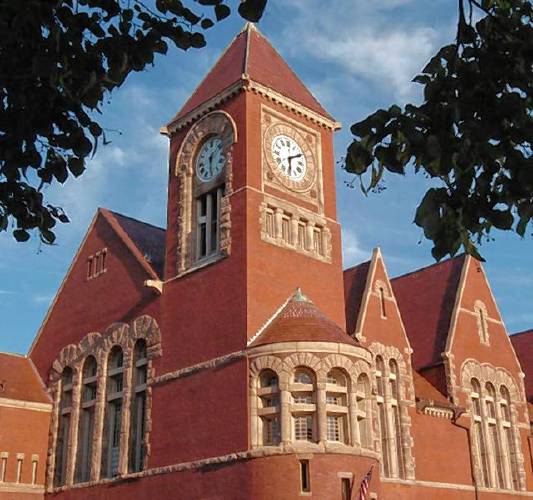
Amherst Town Hall
STAFF FILE PHOTO
AMHERST — A plan to provide $2 million over 10 years toward municipal reparations initiatives, such as programs for youth or first-time homebuyers, could be stymied by the anticipated drying up of tax revenue associated with cannabis sales in Amherst as the main source of funding.
Appreciating that getting to the $2 million threshold in a timely fashion could be increasingly challenging, former town councilor Michele Miller and current School Committee member Irv Rhodes, who served on the African Heritage Reparation Assembly, recently appealed to the Finance Committee to find an alternate funding source for reparations.
Miller told finance officials that it’s important for the Town Council and Finance Committee to discuss the matter. “I remain concerned about the cannabis tax being our model, given we’re seeing a decline in that,” Miller said.
Their conversation with the Finance Committee comes after the June 2022 decision by the Town Council to establish the fund, from which up to $100,000 could be drawn annually to address harms perpetrated against residents of African heritage. The Town Council action called for transferring annually up to $205,000 from certified free cash associated with the adult-use marijuana tax.
But so far, over three years, just $476,966 is in the reparations fund from the cannabis tax. While $210,000 was transferred into the fund following fiscal year 2021, that declined to $134,330 in fiscal year 2022 and went down further to $105,537 in fiscal year 2023. Comptroller Holly Drake said that $58,000 has come in so far in fiscal year 2024, and the town may not even realize $100,000 from cannabis taxes or less than half of what the Town Council had counted on.
Miller said councilors should think about the original commitment made and opportunities to ensure there is sufficient funding.
“It’s about the spirit of commitment we made,” she said.
While she would like to eventually see a private fund managed outside the scope of town government, Amherst is not there yet, Miller said.
The reparations committee won’t be able to give money directly to individuals without state legislation. Instead, it’s looking at creating a Black, Indigenous and people of color-led youth center with programming that addresses the needs of young people of African descent, providing more affordable housing and homeownership opportunities, and establishing a municipal program to teach entrepreneurship skills.
Rhodes said something above and beyond cannabis receipts could be put in the account, possibly 10% of the town’s annual free cash amount, and then a spending plan can be created by a successor reparations committee.
“We are wanting to make sure that fund is augmented on a year-to-year basis,” Rhodes said.
Finance Committee Chairman Bob Hegner said if $75,000 comes from cannabis, and there is a 5% return on investment, the town could hit $2 million in the account by fiscal year 2036, or about four years later than projected. The reparations committee could then pull 4% out of this fund annually going forward, having $1.7 million available for projects over 14 years.
At Large Councilor Mandi Jo Hanneke said another option would be to have a debt-exclusion override to get to the $2 million immediately and not worry about the cannabis revenue or using free cash. Hanneke said the town has significant capital needs and operating revenues and expenses, and she is hesitant to commit anything other than cannabis revenue on a year-to-year basis.
In fact, Hanneke said, getting a new fire station in South Amherst and a new Department of Public Works headquarters — projects for which municipal savings would be used to offset some of the costs to taxpayers — are more important for residents than reparations.
At Large Councilor Ellisha Walker said she would prefer to look at directing free cash to the reparations fund as part of a combination of funding sources. Walker said the town needs to keep regular contributions going through fiscal year 2032, so that a reparations committee can begin tapping funds.
Any amount of free cash directed toward reparations would be a major policy decision, said At Large Councilor Andy Steinberg, and could be financially irresponsible, which runs counter to the charge of the Finance Committee.
The idea of using free cash, District 1 Councilor Cathy Schoen said, comes as extremely difficult years are facing the town and school budgets.
“To commit a specific share of free cash in advance wouldn’t make sense,” Schoen said. “I think we’re on really dangerous grounds if we don’t think, particularly, about our schools.”
More News for you
23 Service Center Rd
Northampton, MA 01060
413-584-5000
Social Media
The Newspapers of New England Family
By using this site, you agree with our use of cookies to personalize your experience, measure ads and monitor how our site works to improve it for our users
Copyright © 2023 to 2024 by H.S. Gere & Sons, Inc. All rights reserved.




